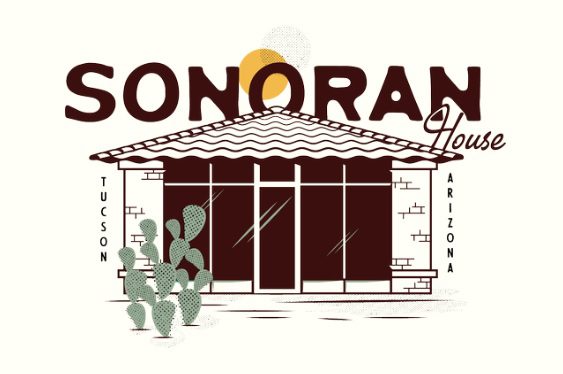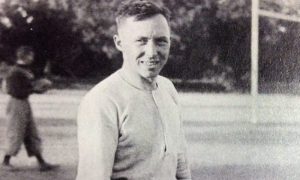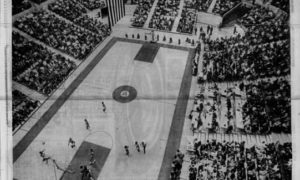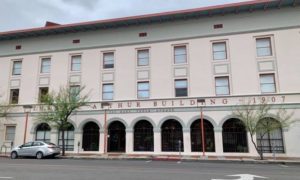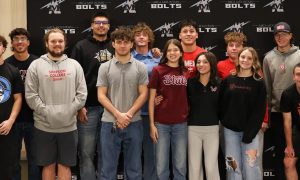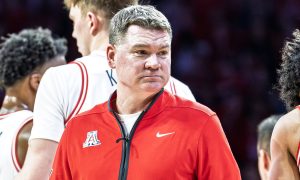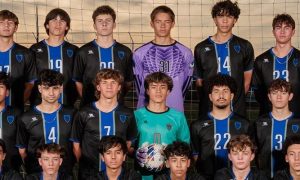FOLLOW @JAVIERJMORALES ON TWITTER!
[rps-paypal]
[ezcol_1half id=”” class=”” style=””]

TABLE OF CONTENTS:
— General history
— J.F. “Pop” McKale
— The games
— Comparisons then and now
— Wildcats nickname
— Military service
— Rankings
— The players
[/ezcol_1half]
[ezcol_1half_end id=”” class=”” style=””]
Clipping of actual L.A. Times article published Nov. 8, 1914
Excerpt from L.A. Times, Nov. 8, 1914, authored by Bill Henry:
“Arizona’s cactus-fed athletes, despite heroic efforts on the part of their two halfbacks, (Asa) Porter and (Franklin) Luis, went down to defeat before the Occidental Tigers yesterday afternoon, the tally with all precincts heard from being 14 to 0 in favor of the Tigers.
Confident of rolling up a big score, the Tigers took the field with grins on their faces, but before the game was 10 seconds old they knew they had a battle on their hands.
The Arizona men showed the fight of wild cats and displayed before the public gaze a couple of little shrimps in the backfield who defied all attempts of the Tigers to stop them.”This site will conduct a countdown in a 100-day period, leading up to Arizona’s 2014 football season-opener with UNLV on Aug. 29 at Arizona Stadium. The 100 Days ‘Til Kickoff countdown will include information daily about the historic 1914 Arizona team that helped create the school’s nickname of “Wildcats” because of how they played that fateful day against Occidental.
[/ezcol_1half_end]
[ezcol_1half id=”” class=”” style=””]

Orville McPherson became a distinguished newspaper businessman in the 30 years after playing at Arizona
In the next few days, the series will provide multiple quick facts of each player. Today’s player is:
Orville “Speedy” McPherson (1893-1982)
Sophomore fullback from Beaver Falls, Pa.
One of two of the 1914 football players who are individually honored in the Arizona Sports Hall of Fame. William Asa Porter is the other.
McPherson moved west from Pennsylvania to Yuma in 1911 at age 17 with his family. He completed his senior season at Yuma Union High School (which was an old territorial prison before transforming to a high school) before moving to Tucson to attend Arizona. He was in the second class to graduate in Yuma County in 1913 and had five classmates.
Arizona, in only its second year of statehood then, gave one college scholarship to each county and McPherson was Yuma County’s recipient. Emzy “Swede” Lynch, another member of the 1914 team, also attended Yuma Union and was the scholarship recipient the year after McPherson earned his.
[/ezcol_1half]
[ezcol_1half_end id=”” class=”” style=””]
THE LAST WEEK IN THE SERIES:
— No. 37: Turner Church Smith, left guard
— No. 38: Ernest James Renaud, fullback
— No. 39: Franklin Luis, halfback
— No. 40: George Sweeney, right end
— No. 41: Emzy “Swede” Lynch, center
— No. 42: Verne La Tourette, left halfback
— No. 43: William Asa Porter, quarterback/fullback
[/ezcol_1half_end]
McPherson and Lynch were honored by former schoolmates in Yuma when Arizona’s train en route to the Occidental game in Los Angeles in 1914 passed through town.
McPherson was paid as a timekeeper and concession operator on the Yuma canal project to cover his portion of his Arizona education.
His esteemed journalist career, which included newspaper editor and publisher roles, began when he was a senior at Arizona in 1916-17. The Tucson Citizen employed him as a night reporter that year.
“I slept in the old Citizen building at 80 S. Stone Avenue,” McPherson told the Citizen in a 1965 interview, “and covered whatever stories came up.”

The 1914 Arizona football team that earned the honor of being named the first “Wildcats” was composed of (front row, left to right): Verne La Tourette, George Seeley, Leo Cloud, Richard Meyer, Asa Porter. Second row: Franklin Luis, Lawrence Jackson, Ray Miller, J.F. “Pop” McKale (coach), Turner Smith, Harry Hobson (manager), Orville McPherson, Albert Crawford, Ernest Renaud. Back row: Albert Condron, Emzy Lynch, Charley Beach, Vinton Hammels, Bill Hendry, George Clawson, Harry Turvey.
(AllSportsTucson.com graphic/Photo from University of Arizona Library Special Collections)
[ezcol_1half id=”” class=”” style=””]
What they were talking about on this day in 1914
Friday, July 24, 1914
News breaks that Austria-Hungary issued an ultimatum to the Serbian government that it would have to accept an Austro-Hungarian inquiry into the assassination of Archduke Ferdinand and his wife. Serbia was also to suppress all anti-Austrian propaganda and to take steps to root out and eliminate terrorist organizations within its borders. Serbia was given 48 hours to meet those demands. The outbreak of war was real. European countries knew that Serbia could not comply to the ultimatum because that would admit Serbia’s guilt in the assassination.
[/ezcol_1half]
[ezcol_1half_end id=”” class=”” style=””]
[/ezcol_1half_end]
That experience followed his stint as the business manager for the Arizona Daily Wildcat, the university’s student newspaper. He graduated from Arizona with a B.S. in Commerce in 1917.
He then served during World War I with the U.S. Army. He battled on three European fronts and was discharged as a captain of the 5th Division, returned to Tucson and was successful in lobbying Washington to bring the Veterans Hospital to Tucson.

Orville McPherson’s nickname “Speedy” was given to him by J.F. “Pop” McKale (University of Arizona Library Special Collections)
Before leaving Tucson to become a newspaper executive in 1922, McPherson was the secretary of the Tucson Chamber of Commerce. He wrote for the Los Angeles Examiner, became general manager of the Milwaukee Sentinel, assistant publisher of the Chicago Herald Examiner and business manager of the Detroit Times. His last newspaper position was editor and publisher of the Kansas City Journal from 1938-43.
During World War II, he moved to Washington, D.C., to become director of the Smaller War Plants Corp. After the war, he moved back to Tucson and served as manager of a financial securities business (Walston & Co.). A co-founder of the Tucson Rotary Club, McPherson was honored as Bicentennial Man of the Year in 1976 by the City of Tucson.

Orville McPherson as a student at Arizona (University of Arizona Library Special Collections)
The Orville McPherson Award is presented annually by the Tucson Rotary Club to a Tucsonan who has contributed to its organization and community in a special way.
In his retirement before passing in 1982 at 89 years old, McPherson was active with the Tucson Press Club, Arizona Scholarship Fund and various civic projects. He was an advocate of citizens funding the university to help the city of Tucson in general.
“The greatest single permanent economic asset in Tucson is the UA and every citizen should contribute something to its support other than tax money,” McPherson told the Citizen in the 1965 article.
Arizona placed him in its Hall of Fame because he was the first athlete to letter four years in football. He evolved into one of J.F. “Pop” McKale’s best. He was also the founder of the McKale Scholarship Fund and first president of Wildcat Lettermen’s club.
McPherson was also responsible for gathering most of the 1914 team members in Tucson for a 50th anniversary celebration with McKale during the 1964 homecoming festivities. He also organized an 80th birthday gala for McKale in Tucson in 1967 but McKale died of a heart attack two weeks before the scheduled event.
“It was going to be the biggest birthday party this state had ever seen,” McPherson told the Tucson Citizen. “Reservations had been pouring in daily. … We had over 300 reservations and over $2,000 in contributions already.”
It was McKale who tabbed McPherson as “Speedy” because of the young player’s ability to shoot out of the backfield. McPherson was also nifty with the drop kick as a fullback. His drop kick for an extra point against Pomona was the difference in a rousing 7-6 homecoming victory in 1914.
ALLSPORTSTUCSON.com publisher, writer and editor Javier Morales is a former Arizona Press Club award winner. He also writes articles for Bleacher Report and Lindy’s College Sports.


